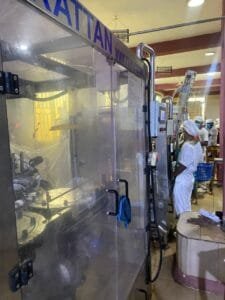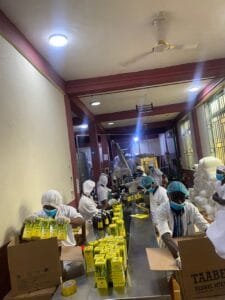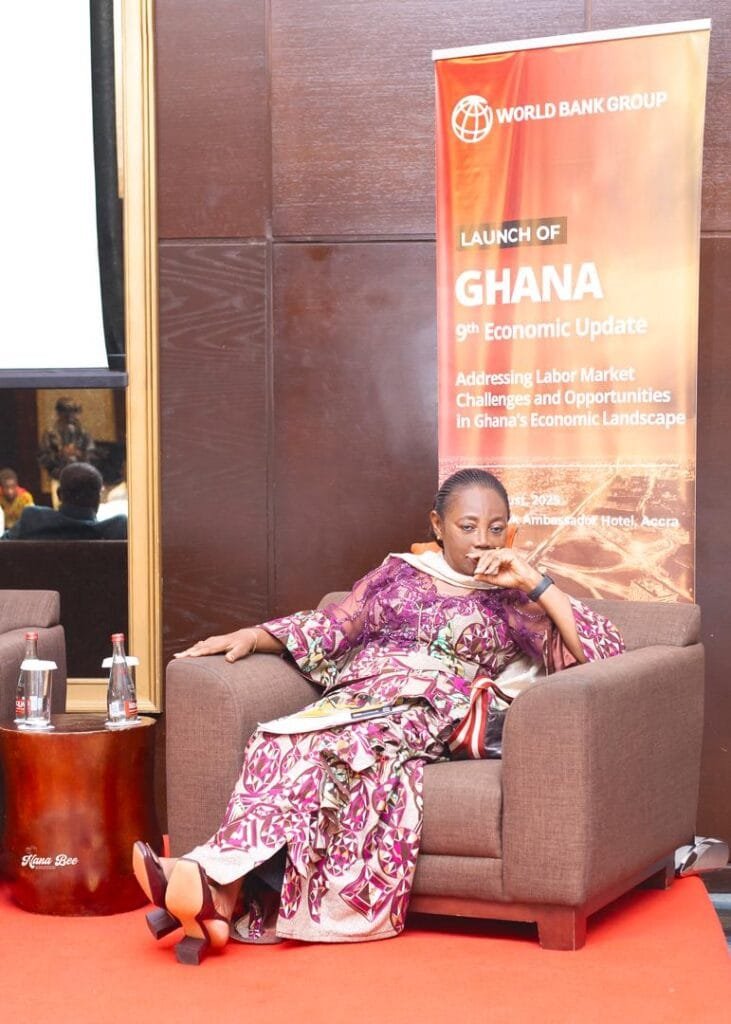Taabea Company Ltd. stands as a prime example of how Ghanaian SMEs are leveraging local resources and traditional knowledge to create innovative solutions in the healthcare sector. Since its inception, the company has made remarkable strides in the production of herbal medicines, offering affordable and effective treatments to a broad spectrum of consumers. With Taabea Herbal Mixture as its flagship product, the company has become a household name in Ghana’s herbal medicine industry, demonstrating that indigenous practices, when combined with innovation, can yield high-quality products that resonate with modern healthcare needs.
The Chief Executive Officer (CEO) of Taabea Company Ltd. Dr. Christian Kwasi Agyeman, reflects on the journey of Taabea Company Ltd. from its humble beginnings to its current magnificent state. He disclosed that he started the company around 2007-2008 after applying for the FDA approval.
According to Dr Agyeman, he had a strong nudge to venture into herbal medicine production, recalling how his grandparents used to prepare traditional remedies in the past. Eventually, the collapse of his previous employment set the pace for him to consider that option. As such, he approached his mother for guidance. With her support, he learned about traditional herbal productions, marking the beginning of his journey into herbal medicine production.
He recounted how he was prompted one day to go into a forest to pluck herbs and added “it to the one my mother showed me. In fact, when I prepared it, I was afraid to take it, so I tried to taste it. [However], before I tasted it, I prayed and said, ‘oh God, I don’t know this one and I’m coming to taste this, if something happens to me, then that’s it’. So when I tasted it, it was around the evening, then I slept. When I woke up in the morning, nothing had happened.”
After realizing that nothing had happened to him in the morning, he became convinced that the herbal mixture he had prepared was not poisonous. Encouraged by a friend’s suggestion, he proceeded to the Herbal Department of the Kwame Nkrumah University of Science and Technology (KNUST) for laboratory analysis.
“When I went there, I presented the medicine to one Professor Kofi Annan of blessed memory… and Tei Larbi, who was a Former Minister, but then was also a lecturer at KNUST. So I presented what I had to them and told them I came to test it. They received it and advised I do whatever I was supposed to do.”
Dr. Agyeman disclosed that the Professors after taking delivery of the herbal mixture advised him to return “in a month’s time because we want to check it for toxicity etc. So, we have to check everything if it’s good for human consumption and all that”.
When the time was due for him to follow up on the laboratory outcome, he returned to the Herbal Department and met with Professor Kofi Annan who “called me to his office and said, ‘young man sit down’. So, I sat down. Then he asked, ‘so, who taught you this medicine?’ Then, I said, ‘oh my grandmother’”.
“Then he said ‘wow, I’ve been working in this lab for 15 good years. I’ve never experienced this kind of medicine. It works seriously. So you’re a young man, I’m going to advise you, we checked everything [and] it’s perfect. So, if you are going to take it serious, I think it’s going to help you. So, don’t worry, we are going to do everything and then, you send it to FDA for registration and all that.’ So, I asked the Professor: ‘…is it good for human consumption?’ Then he said ‘it’s very good; very, very effective. That’s why I was asking who taught you?’”
After receiving the good news, Dr. Agyeman revealed that he left the Professor’s office for him to continue with his further analysis and later returned to pick up the report which was later sent to the Foods and Drugs Authority in 2008. “So that was when I started the medicine.”

Early Struggles and Sustainability Strategies
Dr Christian Kwasi Agyeman highlighted some of the challenges the company encountered initially, particularly among the educated population. He noted that there was a widespread scepticism about herbal medicine, especially concerning its dosage and efficacy. According to him, many believed herbal medicines lacked proper dosage control, often associating them with unscientific practices like boiling ingredients without measurement. This scepticism meant that herbal medicine was mostly accepted among the rural settlements and uneducated populace. To address these doubts, Taabea set out to automate its production procedures, steering away from known traditional methods.
In an effort to modernize his operations, Dr Agyeman attended the IPHEX pharmaceutical program in India, where he learned about advanced pharmaceutical technologies. Upon returning, he invested in automation systems for the company, making it the first company in Ghana to automate herbal medicine production. This move was costly, but it allowed the company to manufacture the medicines without human interference, ensuring higher standards. The process— from boiling and filtering the herbs, to packaging— became fully automated, which helped clear public doubts about the hygiene and precision of the herbal medicine production.
To further disabuse public perceptions, Taabea made a documentary displaying its automated production process. This documentary helped change perceptions about herbal medicine, gaining more trust, even from influential figures like former President John Kufour, who once visited the factory. The documentary demonstrated how the production was done devoid of any human interaction– from boiling the herbs to labelling the products. As a result, people started believing in the company’s products, thanks to the automation process undertaken.
Dr Agyeman emphasized that Taabea Herbal Mixture, the company’s premier product, focuses on treating malaria and as a result, the company avoided making exaggerated claims about the possibility of the product curing multiple diseases. In view of this, he underscored the importance of delivering quality products and not overpromising results.
“So, we decided to also not lie. I told my team that ‘we are not going to say our product can cure this, can cure that; no! So we are going to solely emphasize on it being a cure for malaria, so that when the person takes it, and the person is healed and it benefits the person in other ways, that one becomes a plus to us.’ …We know that we are using a lot of herbs. So, let’s say we are using 30 herbs, and that 30 herbs, one herb is curing one disease. How many diseases [have we cured]? 30 diseases! But we don’t have to make noise about that, we have to just focus on the one outcome; malaria. So, when all is done and that person takes it, and something happens to him, like it cures another disease for that person, then it becomes a plus for us. That person then goes about advertising for us [as well]. Above all, God also intervened and worked in our favor.”
Calls For Support to Boost the Herbal Medicine Sector
Meanwhile, Dr Christian Kwasi Agyeman revealed that neither his company nor any company in the herbal medicine sector has received any government support, despite his long-standing advocacy for the government to invest in the herbal sector. He noted that while governments focus on the pharmaceutical and orthodox medicine industries, they overlook the contributions of the herbal industry to the economy. However, he stated that herbal companies, play a crucial role in the economy as compared to the pharmaceutical companies that benefit from government’s support. Also, he cited lack of doctor prescriptions of herbal medicines to their patients, which leads the players in the sector to rely on word-of-mouth sales.
In view of this, Dr Agyeman emphasized that government’s support for the herbal industry should mirror the support given to the pharmaceutical sector. He claimed that by adopting automation, his company has dispelled doubts about the safety and quality of herbal medicine. The automated production, according to him, ensures cleanliness and consistency, making the products more acceptable to consumers and suitable for export. He highlighted that his company, for example, has already gained international recognition as a result of its automation, but other herbal companies struggle due to lack of financial accessibility and government support to automate their operations.
Meanwhile, Dr Agyeman credited the success of Taabea Company Ltd. to the support of Ghanaians, who have embraced the product and helped it to grow. However, he believes that if government offers a fraction of the support given to pharmaceuticals, the herbal sector could expand significantly. He suggested that providing facilities like low-interest loans or easing the importation of machines, could boost the sector’s production capacity, allowing herbal companies to better serve the public and expand their markets.
Moreover, he noted the effectiveness of herbal medicines in treating conditions like malaria, often outperforming orthodox medicines. It is known that herbal remedies, from natural products, provide an alternative treatment option that many people prefer. As such, with more government intervention, the herbal industry could enhance its contributions to healthcare and economic development in Ghana.
“I remember I went to a certain program in California, I represented Ghana. When I went there, I observed that the herbal industry is advancing and even the herbal drugs are more expensive than the pharmaceutical. Why? Because it’s natural, it’s organic. Something that is organic is organic, and we are producing the organic ones, so it’s expensive over there but here, it’s the cheapest.”

Market Identification And Penetration
Dr Agyeman, discussing how Taabea identifies its markets, disclosed that the company analyses the trends and monitors the product demands by keeping track of calls and inquiries about the products and also travels to various countries to observe the market conditions at first-hand. Moreover, the advent of the AfCFTA (African Continental Free Trade Area) has prompted Taabea to consider expanding into the African market, with its products already available in Kenya.
However, Dr Agyeman expressed concerns about the numerous trade barriers on the continent that hinder intra-continental business, advocating for discussions among African leaders to facilitate easier trade among member countries.
To ensure the company’s products reach wider markets without disrupting existing businesses in foreign countries such as Liberia, the USA, Germany, and the Caribbean’s, Taabea adopts a collaborative approach with its distributors, allowing them to lead the sales in such countries. This strategy, according to him, enables the company to assess whether its products are gaining traction and how it can effectively penetrate new markets.
Taabea’s Differentiating Factors: Quality and Innovation
Dr Agyeman shared an experience of receiving representatives from the World Health Organization (WHO) who visited the company’s factory. After touring the facility, according to him, they compared it to other factories they had visited in Madagascar, Nigeria, and other African countries. The WHO representatives commended that Taabea was one of the best factories they had visited across the continent, noting the high level of automation and the presence of a fully equipped laboratory. As a result, they recommended other herbal companies in other African countries to emulate Taabea’s practices and operations.
The visit was part of a larger initiative by the WHO to explore the role of traditional and herbal medicine in health care, particularly in light of the COVID-19 pandemic. Recognizing the significant contributions of herbal medicine during the time, the WHO aimed to identify effective herbal production centers in Africa.
The fact that Taabea was selected for the visit underscored its reputation in the herbal industry, highlighting the company’s commitment to quality and innovation in the production of herbal medicines.
Taabea’s Humble Beginnings
Dr Agyeman shared the humble beginnings of Taabea Company Ltd., revealing that he started with only GH¢100. Despising not his humble beginnings, he revealed how such moments unearthed his creative ability to find ways and means in making the business succeed. He disclosed that the initial days of selling the products were challenging yet shaping. “…So with GH¢100, that’s how I started.”
He revealed how he had to personally involve himself in the marketing of the product by advertising on a “community radio” in Kejetia Central Market, the biggest market in the Ashanti Region. “So I will go and pay money [about] GH¢10 to a man who would in turn give me a microphone which I would use to promote my product.”
He noted that with persistence, determination, discipline, focus and favor of God, Taabea became endeared to the market women as a result of its potency. Recalling the good old days, he demonstrated how he marketed the medicine to these market women saying “This is Taabea herbal medicine, it’s good for Malaria.”
Currently, Taabea Company Ltd. is the leading herbal manufacturer in Ghana, distributing to eight African countries, the Caribbean’s, the USA, Germany and some other countries across the globe. This growth came on the back of the founder’s modest lifestyle choices, including surviving on basic meals like braised rice and salted beef in order to reinvest more resources into the growth of the business.
Throughout this period, Dr Agyeman emphasized the importance of focus, planning, and discipline in the company’s approach. Rather than he indulging in luxurious lifestyle, he prioritized reinvesting the profits into the business to enhance its production capabilities. He emphasized that careful planning and financial discipline were vital for the company’s success. He further revealed that his commitment to growing the business also included seeking wisdom and guidance from God, which he believes helped the company navigate the challenges and made prudent decisions. This mindset laid a foundation for the company’s operational strategy, leading to sustained growth and the ability to eventually purchase their manufacturing equipment and properties.
Dr Agyeman further underscored the significance of building strong relationships and trust with suppliers. He disclosed that he earned the trust of his suppliers, as such, they voluntarily offered to give him some of the materials required for production in large quantities, further fuelling the company’s growth. Managements’s consistent approach of reinvesting profits and being faithful to their commitments contributed to a cycle of continuous supplies from their suppliers.
Transitioning into an industrialized enterprise, Dr Agyeman disclosed that the company has acquired large parcels of land to be used to expand the company’s production. However, he divulged his disaffection for bank’s credit facilities to expand his business, rather opting for ploughing back his profit into the business to grow it gradually. Having had a past experience with an overdraft facility, where he borrowed against his own deposited funds to help him undertake a contract, he recounted how the interest rate on the overdraft ‘drowned’ his profits.
Taabea’s Product Diversification
Taabea Company Ltd. has a varied product offerings, significantly focusing on herbal remedies. The company’s herbal medicines include the renowned Taabea Herbal mixture, known for its effectiveness against malaria; Taabea Taacum, for male and female vitality; Taabea Herbal Capsules, for detoxification; and a new product targeting infections, known as Taabea Zanecare Herbal Mixture.
Recently, the company ventured into the alcoholic beverage industry with the introduction of Jaga 4 Bitters, which was launched in collaboration with a popular, artist Shatta Wale. This new direction also includes plans for additional products such as red wine and fruit juices, all made from natural herbs, currently under development. In addition to the beverage production, Taabea is expanding into the real estate sector, focusing on building estates in locations like Accra and Kumasi.
The Origin of The Name Taabea
Taabea, a house-hold name in the herbal medicine industry, has proven its efficacy when it comes to its functionality. According to Dr. Agyeman, the CEO of Taabea Company Ltd., “The Name Taabea is my mother’s name. My mother is called Akua Taabea. So when I was coming out with this product, I was thinking: ‘what do I name the company? Do I make it Chris Herbal?’ Then, I said no. Then something came to mind: my father called my mother, Taabea. That name is not common, so [I pondered) ‘why don’t I use that name?’ Then quickly, I decided to use the name.”

Governments’ Roles in Strengthening the African Market
Considering the potentiality of the African market, Dr Agyeman urged African governments to create an enabling environment for businesses to thrive, emphasizing the immense opportunities within the continent. He pointed out that, in spite of the competition against international markets, African companies face significant challenges due to high interest rates, which in Ghana, for example, is at 36%, compared to just 2% in countries like India. This disparity makes it difficult for African businesses to compete globally, as they struggle with financial burdens that their international counterparts do not face. As such, Dr. Agyeman called on African governments to recognize the issue and adjust interest rates and support various systems to foster growth in the sector.
Furthermore, Dr. Agyeman highlighted the need for African countries to facilitate easier trades among themselves. He noted that while international competitors, such as Indian pharmaceutical companies, can easily enter African markets, local businesses like Taabea Company Ltd., are hindered by barriers that prevent them from expanding into neighbouring African countries.
In view of that, Dr. Agyeman emphasized that the solution lies in reducing trade barriers and fostering collaboration among African nations. He drew comparison to the seamless trade practices seen in Europe, where products can move freely across borders without intervention.
“Why can’t I also move my products from Ghana to Nigeria? Or Nigeria to Ghana or Cote d’Ivoire? We are all breaking ourselves and how can we grow? So, they need to clear these barriers for us, so that we do business among ourselves in Africa and see what will happen in the next generation; let’s see what Africa will be”.
What the Future Holds for Taabea Company Ltd.
In the next five to ten years, Taabea Herbal Company envisions becoming a globally recognized brand, expanding its presence in the international markets. The company aims to establish its products in supermarkets and Afro shops worldwide, particularly in African communities. Recent interest from overseas partners, including Pakistani investors looking to distribute their products in major markets like London and Europe, underscores this ambition.
Moreover, Dr Agyeman emphasized that sustaining the growth of Taabea Company Ltd. hinges on a steadfast commitment to quality and consistency rather than a primary focus on the financial gain. He believes that prioritizing product quality will ultimately position the company favourably in the market, as meeting customer expectations will foster loyalty and demand.
Additionally, Dr Agyeman highlighted the importance of investing in high-quality packaging and product content. He stressed that the company sources its packaging materials from outside the country to ensure superior quality and security, despite the potential higher costs. By prioritizing the effectiveness of the company’s products and its presentation, he aims to ensure that every customer experience is positive. This strategy, he believes, will not only maintain customer satisfaction but also support the company’s sustained growth in a competitive market.
The CEO of Taabea Company Ltd. outlined several strategic approaches for the company to maintain relevance and engage with a digitally-oriented audience. Recognizing the importance of adapting to a computerized world, he stated that the company is shifting its marketing strategy away from the traditional advertising methods and embracing digital platforms, particularly social media, to promote its products. By targeting younger consumers, including infants who will grow up recognizing the Taabea brand, the company aims to establish a strong presence among the youth.
A significant element of the company’s strategy is the integration of music into its advertising campaigns. Dr Agyeman believes that music, often referred to as the ‘food of the soul’, resonates deeply with audiences, making it an effective tool for brand recognition and connection. By associating the company’s products with music, it seeks to create memorable experiences that will keep the brand top-of-mind, especially when consumers think about malaria-related products.









